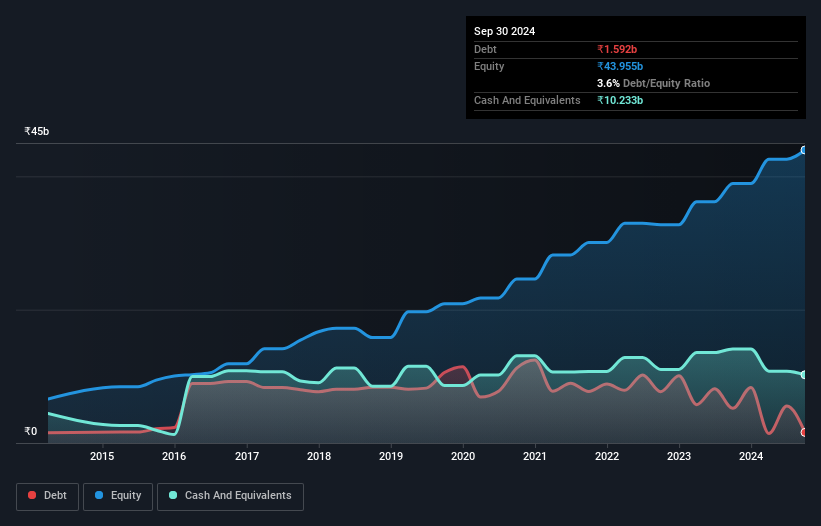- India
- /
- Life Sciences
- /
- NSEI:SYNGENE
We Think Syngene International (NSE:SYNGENE) Can Stay On Top Of Its Debt

Howard Marks put it nicely when he said that, rather than worrying about share price volatility, 'The possibility of permanent loss is the risk I worry about... and every practical investor I know worries about.' It's only natural to consider a company's balance sheet when you examine how risky it is, since debt is often involved when a business collapses. We can see that Syngene International Limited (NSE:SYNGENE) does use debt in its business. But should shareholders be worried about its use of debt?
When Is Debt A Problem?
Debt assists a business until the business has trouble paying it off, either with new capital or with free cash flow. In the worst case scenario, a company can go bankrupt if it cannot pay its creditors. However, a more common (but still painful) scenario is that it has to raise new equity capital at a low price, thus permanently diluting shareholders. By replacing dilution, though, debt can be an extremely good tool for businesses that need capital to invest in growth at high rates of return. When we examine debt levels, we first consider both cash and debt levels, together.
Check out our latest analysis for Syngene International
What Is Syngene International's Debt?
As you can see below, Syngene International had ₹1.59b of debt at September 2024, down from ₹5.20b a year prior. However, its balance sheet shows it holds ₹10.2b in cash, so it actually has ₹8.64b net cash.

How Healthy Is Syngene International's Balance Sheet?
According to the last reported balance sheet, Syngene International had liabilities of ₹9.41b due within 12 months, and liabilities of ₹8.00b due beyond 12 months. Offsetting this, it had ₹10.2b in cash and ₹5.02b in receivables that were due within 12 months. So it has liabilities totalling ₹2.15b more than its cash and near-term receivables, combined.
This state of affairs indicates that Syngene International's balance sheet looks quite solid, as its total liabilities are just about equal to its liquid assets. So while it's hard to imagine that the ₹339.9b company is struggling for cash, we still think it's worth monitoring its balance sheet. While it does have liabilities worth noting, Syngene International also has more cash than debt, so we're pretty confident it can manage its debt safely.
But the bad news is that Syngene International has seen its EBIT plunge 19% in the last twelve months. We think hat kind of performance, if repeated frequently, could well lead to difficulties for the stock. There's no doubt that we learn most about debt from the balance sheet. But ultimately the future profitability of the business will decide if Syngene International can strengthen its balance sheet over time. So if you're focused on the future you can check out this free report showing analyst profit forecasts.
Finally, while the tax-man may adore accounting profits, lenders only accept cold hard cash. While Syngene International has net cash on its balance sheet, it's still worth taking a look at its ability to convert earnings before interest and tax (EBIT) to free cash flow, to help us understand how quickly it is building (or eroding) that cash balance. Over the most recent three years, Syngene International recorded free cash flow worth 61% of its EBIT, which is around normal, given free cash flow excludes interest and tax. This cold hard cash means it can reduce its debt when it wants to.
Summing Up
We could understand if investors are concerned about Syngene International's liabilities, but we can be reassured by the fact it has has net cash of ₹8.64b. So we are not troubled with Syngene International's debt use. There's no doubt that we learn most about debt from the balance sheet. However, not all investment risk resides within the balance sheet - far from it. To that end, you should be aware of the 1 warning sign we've spotted with Syngene International .
If you're interested in investing in businesses that can grow profits without the burden of debt, then check out this free list of growing businesses that have net cash on the balance sheet.
New: Manage All Your Stock Portfolios in One Place
We've created the ultimate portfolio companion for stock investors, and it's free.
• Connect an unlimited number of Portfolios and see your total in one currency
• Be alerted to new Warning Signs or Risks via email or mobile
• Track the Fair Value of your stocks
Have feedback on this article? Concerned about the content? Get in touch with us directly. Alternatively, email editorial-team (at) simplywallst.com.
This article by Simply Wall St is general in nature. We provide commentary based on historical data and analyst forecasts only using an unbiased methodology and our articles are not intended to be financial advice. It does not constitute a recommendation to buy or sell any stock, and does not take account of your objectives, or your financial situation. We aim to bring you long-term focused analysis driven by fundamental data. Note that our analysis may not factor in the latest price-sensitive company announcements or qualitative material. Simply Wall St has no position in any stocks mentioned.
About NSEI:SYNGENE
Syngene International
A contract research and manufacturing company, provides drug discovery and development services in India, the United States of America, Europe, and internationally.
Flawless balance sheet with reasonable growth potential.

